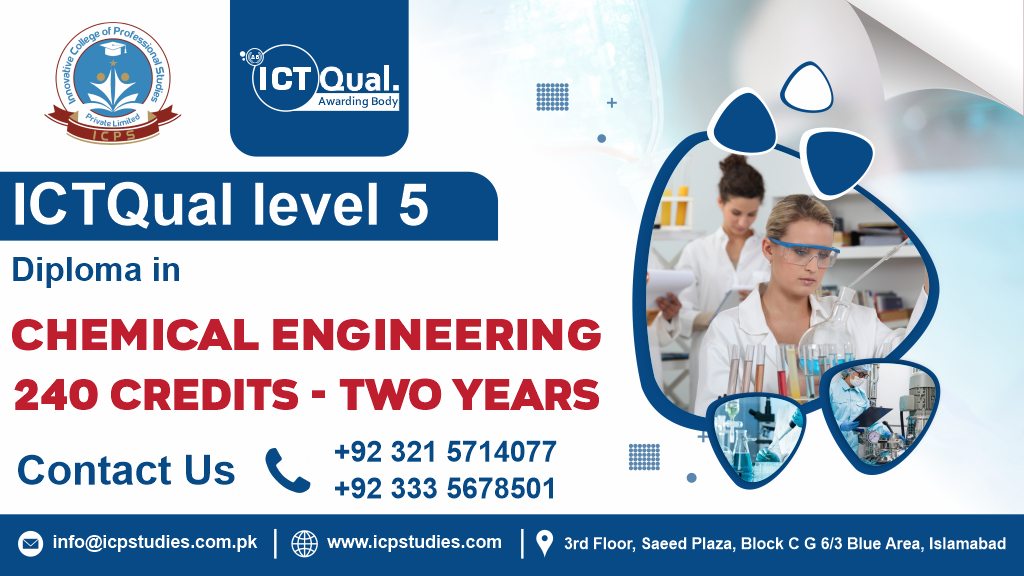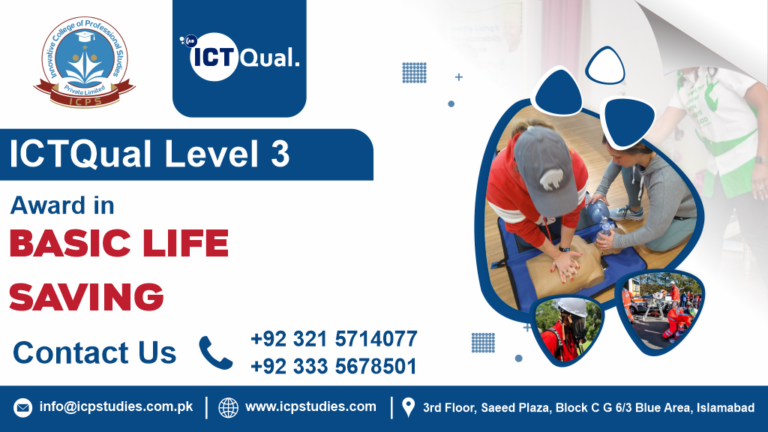If you’re looking to build an advanced career in chemical engineering, the ICTQual Level 5 Diploma in Chemical Engineering offers a comprehensive education designed to equip you with the technical skills and knowledge required to excel in this dynamic field. Over two years and 240 credits, this qualification offers a deep dive into both the theoretical and practical aspects of chemical engineering, preparing you for a variety of roles in industries such as energy, pharmaceuticals, food production, and environmental sustainability.
The ICTQual Level 5 Diploma in Chemical Engineering is a specialized qualification that combines advanced knowledge of chemical processes with practical problem-solving skills. Designed for those aiming to become experts in chemical engineering, the course covers everything from basic chemistry and materials science to advanced thermodynamics and process control. By completing this two-year program, students will be well-equipped to meet the demands of modern industries and contribute to innovative engineering solutions.
The ICTQual Level 5 Diploma in Chemical Engineering is a comprehensive, industry-focused qualification designed to equip students with the advanced skills and knowledge necessary to thrive in the fast-paced world of chemical engineering. By combining core engineering principles with specialized topics, this two-year, 240-credit diploma prepares students for a wide range of career opportunities and provides a solid foundation for future academic advancement. If you’re ready to advance your career and become a leader in the chemical engineering industry, this diploma is the perfect next step.
All About ICTQual Level 5 Diploma in Chemical engineering 240 Credits – Two Years
Course Overview
The ICTQual Level 5 Diploma in Chemical Engineering is an advanced, industry-recognized qualification designed to equip students with the specialized knowledge and technical skills required to excel in the dynamic field of chemical engineering. This two-year course, awarding 240 credits upon completion, provides an in-depth exploration of both the theoretical and practical aspects of chemical engineering.
Throughout the program, students will engage with key topics such as chemical process design, thermodynamics, fluid mechanics, environmental sustainability, and process control systems. With a strong emphasis on hands-on learning, the course integrates laboratory-based work, real-world case studies, and an industry placement, ensuring that graduates are fully prepared to meet the challenges of the modern chemical engineering sector.
Whether you’re an aspiring chemical engineer or a professional looking to deepen your expertise, this course offers the tools and knowledge needed to advance your career in industries like pharmaceuticals, energy, manufacturing, and environmental management. The ICTQual Level 5 Diploma in Chemical Engineering is your gateway to becoming a highly skilled engineer, capable of tackling complex problems and contributing to the development of innovative, sustainable engineering solutions.
Study Units
- Year 1 (120 Credits)
- Semester 1
- Introduction to Chemical Engineering Principles
- Engineering Mathematics and Statistics
- Material and Energy Balances
- Thermodynamics
- Chemistry for Engineers
- Fluid Mechanics
- Semester 2
- Heat Transfer Processes
- Chemical Process Industries
- Mechanical Properties of Materials
- Laboratory Skills and Safety
- Environmental Science and Sustainability
- Technical Communication and Report Writing
- Year 2 (120 Credits)
- Semester 1
- Advanced Thermodynamics
- Advance Fluid Mechanics
- Process Control and Instrumentation
- Chemical Reaction Engineering
- Separation Processes
- Industrial Health and Safety Management
- Semester 2
- Chemical Process Design and Simulation
- Advanced Separation Processes
- Energy Systems and Renewable Technologies
- Advance Chemical Reaction Engineering
- Industrial Project Management
- Research Project in Chemical Engineering
To enroll in the ICTQual Level 5 Diploma in Chemical Engineering, applicants must meet the following entry requirements:
- Educational Qualifications:
- A Level 3 qualification in engineering, chemistry, or a related field (e.g., A-levels in Mathematics, Physics, or Chemistry, or an equivalent vocational qualification such as a BTEC National Diploma).
- Alternatively, applicants with relevant work experience in a technical or engineering role may also be considered for entry.
- Mathematics and Science Proficiency:
- A solid understanding of mathematics (algebra, calculus) and science (particularly chemistry and physics) is essential for success in this course. Applicants should have a background in these subjects from their previous studies.
- English Language Proficiency (if applicable):
- For non-native English speakers, an IELTS score of 5.5 or equivalent, or another recognized English language qualification, may be required to demonstrate sufficient proficiency in reading, writing, speaking, and listening.
- Motivation and Interest:
- A keen interest in chemical engineering and a strong motivation to develop both theoretical knowledge and practical skills in the field of chemical processes and systems.
- Interview or Assessment (if applicable):
- Some institutions may require applicants to undergo an interview or assessment to determine their suitability for the course, particularly if they do not meet the formal educational requirements but possess relevant industry experience.
Applicants who meet these entry requirements will be well-prepared to undertake the challenging yet rewarding ICTQual Level 5 Diploma in Chemical Engineering.
The ICTQual Level 5 Diploma in Chemical Engineering (240 Credits) is ideal for individuals who are passionate about pursuing or advancing a career in chemical engineering. This course is designed for:
- Aspiring Chemical Engineers
- Individuals looking to build a strong foundation in chemical engineering and embark on a career in industries such as pharmaceuticals, energy, petrochemicals, and environmental management.
- Engineering Technicians or Technologists
- Professionals with a background in engineering or related fields (such as mechanical, electrical, or civil engineering) who wish to specialize in chemical engineering and enhance their skill set.
- Recent Graduates of Level 3 Engineering Programs
- Those who have completed a Level 3 qualification (e.g., A-levels or a BTEC National Diploma) in engineering, chemistry, or physics and are seeking to further their studies and develop expertise in chemical engineering.
- Industry Professionals Seeking Career Advancement
- Individuals working in technical or operational roles within the chemical, manufacturing, or process industries who want to deepen their understanding of chemical engineering principles and progress into more senior or specialized positions.
- Those Interested in Sustainability and Innovation
- Professionals who want to focus on sustainable practices in chemical processes, such as reducing environmental impacts, improving energy efficiency, and advancing green technologies in chemical engineering.
- People Seeking a Career Change
- Those from related fields such as chemistry, physics, or environmental sciences, who are looking to transition into chemical engineering with a view to working in innovative industries like clean energy, biotechnology, or water treatment.
If you are eager to become an expert in chemical engineering and wish to work on cutting-edge solutions in process design, manufacturing, environmental sustainability, or safety, this course is tailored to help you achieve those goals.
Learning Outcomes
Year 1 (120 Credits)
Semester 1
- Introduction to Chemical Engineering Principles
- Understand the role of chemical engineering in industrial processes.
- Analyze fundamental concepts such as mass transfer, fluid flow, and heat exchange.
- Apply core engineering principles to solve real-world chemical process challenges.
- Engineering Mathematics and Statistics
- Utilize advanced mathematical techniques to tackle engineering problems.
- Interpret and analyze statistical data relevant to chemical processes.
- Develop mathematical models for simulating chemical systems.
- Material and Energy Balances
- Perform mass and energy balance calculations to evaluate chemical systems.
- Assess process efficiency and resource utilization.
- Apply conservation principles to real-life chemical engineering scenarios.
- Thermodynamics
- Explain thermodynamic principles related to energy and material transformations.
- Solve problems involving the first and second laws of thermodynamics.
- Analyze phase equilibrium and thermodynamic properties of various substances.
- Chemistry for Engineers
- Comprehend chemical principles essential for engineering processes.
- Analyze chemical reactions, stoichiometry, and kinetics.
- Assess the behavior of materials in various chemical environments.
- Fluid Mechanics
- Understand fluid properties and their impact on engineering systems.
- Design and analyze fluid flow systems using principles like Bernoulli’s equation.
- Solve engineering problems related to pumps, turbines, and pipe networks.
Semester 2
- Heat Transfer Processes
- Understand heat transfer mechanisms including conduction, convection, and radiation.
- Design and optimize heat exchangers for industrial applications.
- Evaluate thermal efficiency and enhance heat transfer systems.
- Chemical Process Industries
- Analyze key chemical industries such as petrochemical, pharmaceutical, and food processing.
- Understand industrial processes from raw material input to final product output.
- Evaluate the economic and environmental aspects of chemical production.
- Mechanical Properties of Materials
- Study material behavior under stress, strain, and temperature variations.
- Evaluate the suitability of materials for chemical engineering applications.
- Analyze failure modes and select materials for specific chemical processes.
- Laboratory Skills and Safety
- Develop practical laboratory skills for chemical analysis and experimentation.
- Follow safety protocols, perform risk assessments, and maintain a safe lab environment.
- Accurately record, analyze, and interpret experimental data.
- Environmental Science and Sustainability
- Comprehend the environmental impacts of chemical engineering processes.
- Develop sustainable engineering solutions for waste management and energy efficiency.
- Understand regulatory requirements for environmental protection.
- Technical Communication and Report Writing
- Strengthen technical writing skills for clear and concise communication.
- Prepare comprehensive engineering reports and documentation.
- Effectively present technical findings to both technical and non-technical audiences.
Year 2 (120 Credits)
Semester 1
- Advanced Thermodynamics
- Analyze advanced thermodynamic cycles and systems.
- Solve complex problems involving multi-phase and non-ideal systems.
- Apply thermodynamic principles to optimize industrial processes.
- Advanced Fluid Mechanics
- Study advanced fluid dynamics concepts, including turbulence and compressible flow.
- Design and optimize fluid transport systems.
- Use computational tools to model fluid behavior in engineering applications.
- Process Control and Instrumentation
- Understand process control principles, including feedback and feedforward systems.
- Design effective control strategies for chemical processes.
- Utilize modern instrumentation and sensors for monitoring chemical processes.
- Chemical Reaction Engineering
- Analyze reaction kinetics and reactor design.
- Optimize the performance of chemical reactors for efficiency and safety.
- Apply modeling techniques to scale up reactions from laboratory to industrial settings.
- Separation Processes
- Comprehend separation techniques such as distillation, filtration, and chromatography.
- Design and evaluate industrial separation systems.
- Optimize separation processes for energy and cost efficiency.
- Industrial Health and Safety Management
- Analyze risks associated with chemical engineering processes.
- Develop safety management plans and emergency protocols.
- Ensure compliance with health and safety regulations in industrial environments.
Semester 2
- Chemical Process Design and Simulation
- Use process simulation tools to design and analyze chemical processes.
- Develop process flow diagrams and identify optimization opportunities.
- Evaluate the economic feasibility of chemical process designs.
- Advanced Separation Processes
- Explore complex separation techniques, including membrane processes and crystallization.
- Design advanced separation systems for high-purity product requirements.
- Assess environmental impacts of advanced separation technologies.
- Energy Systems and Renewable Technologies
- Analyze energy systems and their applications in chemical engineering.
- Develop solutions using renewable energy technologies within the process industries.
- Evaluate energy efficiency and sustainability in industrial chemical processes.
- Advanced Chemical Reaction Engineering
- Investigate complex reaction mechanisms and multi-reaction systems.
- Optimize catalytic and non-catalytic reactions in industrial reactors.
- Utilize computational tools for modeling and simulating chemical reactions.
- Industrial Project Management
- Plan, execute, and monitor engineering projects within the chemical process industries.
- Apply project management tools and techniques to ensure timely and efficient project completion.
- Manage project scope, resources, and budgets effectively.
- Research Project in Chemical Engineering
- Conduct independent research on a chemical engineering topic of interest.
- Apply theoretical knowledge to solve practical engineering problems through experiments or simulations.
- Present research findings through detailed reports and professional presentations.
These learning outcomes ensure that upon completion of the ICTQual Level 5 Diploma in Chemical Engineering, students will have acquired a robust understanding of both fundamental and advanced concepts in chemical engineering, preparing them for a variety of roles within the industry.
FAQs about ICTQual Level 5 Diploma in Chemical engineering 240 Credits – Two Years







